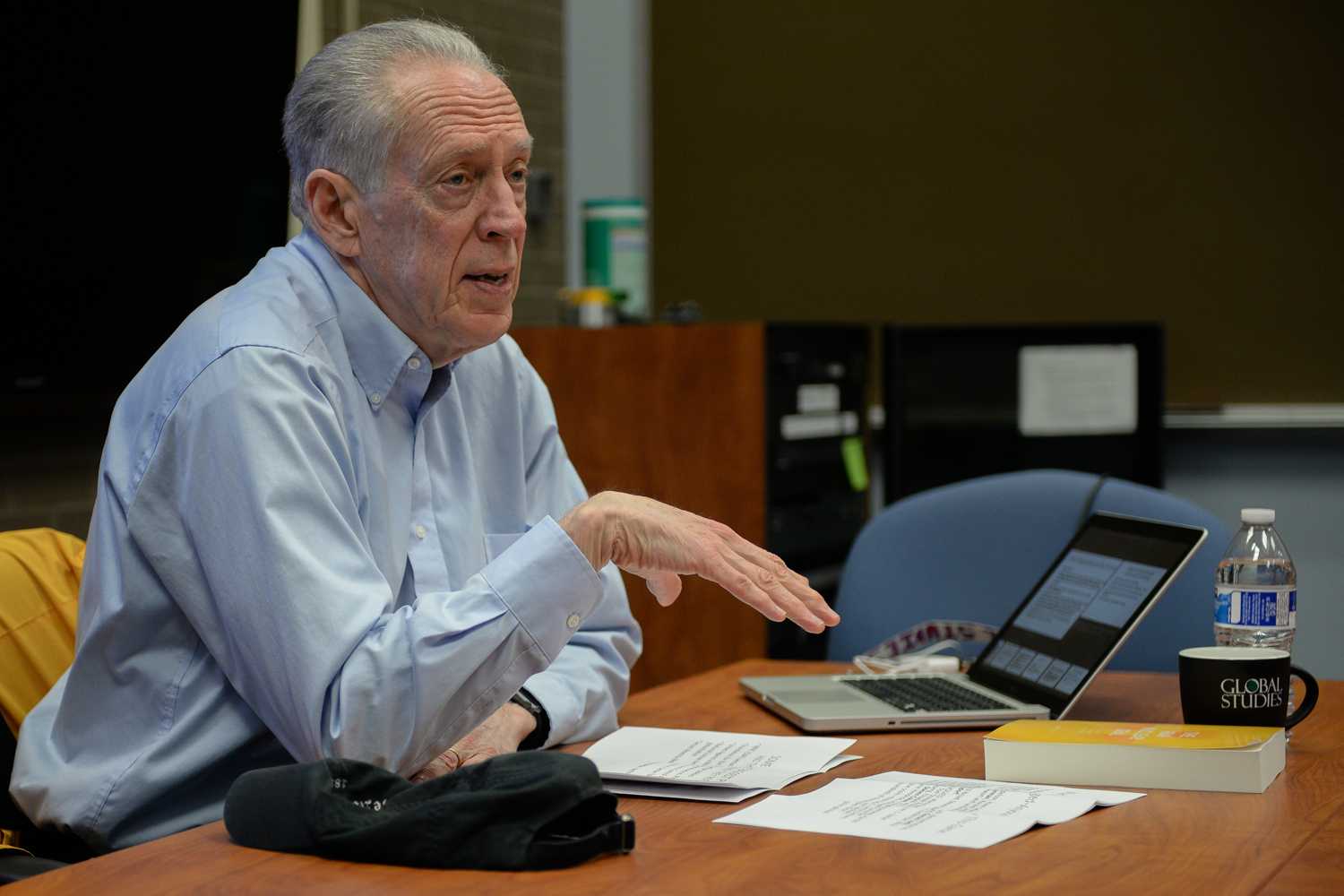Former ambassador examines Iran nuclear deal


Former Ambassador Dennis Jett leads a discussion on the Iran Nuclear Deal Thursday afternoon. (Photo by Divyanka Bhatia | Staff Photographer)
Former U.S. ambassador Dennis Jett equated the Iran Nuclear Deal negotiations to a “foreign policy food fight” Thursday in Posvar Hall.
“One should not confuse honesty and politics — they’re like oil and water,” Jett said.
Jett, who served as ambassador to Mozambique and Peru under the Clinton administration, spoke to a crowd of 15 about his new book “The Iran Nuclear Deal: Bombs, Bureaucrats, and Billionaires.” The Global Studies Center, along with the Center for Educational Resources on Islamic Studies and Pitt Global Affairs Club, hosted the event.
The Iran Deal, Jett said, was an agreement made in 2015 during former President Barack Obama’s second term between the Islamic Republic of Iran and the P5+1, which includes the permanent members of the United Nations Security Council — the United States, the United Kingdom, Russia, France and China — and the European Union. The agreement was that Iran would reduce its nuclear facilities in exchange for all nuclear-related economic sanctions in Iran being lifted, which would release more than $100 billion in frozen assets.
The role of the United States in this plan is to sign a waiver suspending the sanctions every 120 days, but President Donald Trump has repeatedly criticized the deal as not being in the United States’ best interests, calling it “the worst deal ever made.”
Jett said the recent influences of money, technology, partisan politics, globalization and a growing disregard for truth complicated the way this agreement was made and followed.
“But what’s not new [is that] elected officials, political appointees and bureaucrats don’t think the same,” Jett said.
In his book, Jett argues that the Iran Deal was a fight over congressional and public opinion with billionaires on both sides of the deal.
“Anyone can play this game,” Jett said. “You had rabbis for the deal, you had rabbis against it. You had diplomats, including me, for the deal and against it.”
Jett spoke about another area of conflict related to differences in which people view history. He defined history as “what a country chooses to remember” and contrasted Iran’s version of history with America’s version.
“I think what rankles most with Iranians was the Iraq War,” Jett said. “In the American version it’s all about ‘Argo.’”
“Argo” refers to a film based on the Iran Hostage Crisis, when thousands of Iranians stormed the U.S. Embassy Nov. 4, 1979, in Tehran and took 66 Americans hostage. Americans viewed the crisis as shocking, while the Iranians believed it was justified due to American intervention in Iranian politics. Jett said these differing views largely influenced the contention between the two countries, still impacting the Iran Deal today.
Jett also said the critics of this deal said the agreement is not sufficient in preventing Iran from building nuclear weapons, and that a better deal could be achieved by having greater sanctions.
“My argument is basically that the critics are never gonna be satisfied,” he said.
Currently, Trump is planning to work with European partners to create an agreement that will limit Iran’s ballistic missile activity and testing and make modifications to the existing deal if it is made permanent. But Jett said he thinks this debate will continue for a long time and that the chaos of this deal will only escalate further.
“The daily White House psychodrama will continue,” Jett said. “I wake up everyday and wonder if it can get any worse.”
Tanisha Joseph, a junior economics and statistics major and business manager of the Global Affairs Club, said she appreciated that Jett used language and examples easily understood to those who might not be as informed about global politics. She said she helped found the club to educate students about the impact of politics around the world.
“I feel like in college we’re trapped in a bubble,” she said.
Sophomore economics and philosophy major Eric Workman attended the talk because he had heard the former ambassador speak before and enjoyed his views, despite their contrasts to his own.
“I would say he was a little more radical [than me],” he said.
Recent Posts
First Place | The summer apartment
See two girls: one 19, the other 20. They’re both engineering students far from home,…
Second Place | Moist and buttery gluten-free coffee cake
This gluten-free coffee cake is so indulgent you would never even know it was free…
Third Place | Dinner rush
Runner, please. Hands. Behind. 86 zucchini. Heard. There’s a slight ringing in my ears, and…
Runner-Up | Let me tell you about hobbies and death
Well, everyone has to have a hobby. Mom says you gotta love something or else…
Runner-Up | Artemis
In her dream, the moon exploded. Something hit it from behind — some dark shadow,…
Runner-Up | Setting the scene
My father and I are running through the forest. Our footsteps pound with silent desperation…

